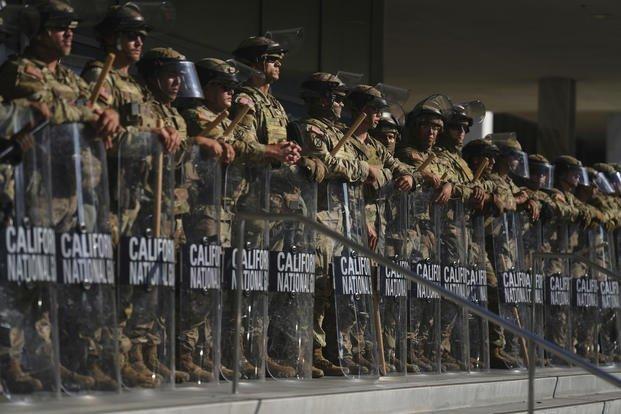Military Deployment in Los Angeles: Navigating Challenges Amid ICE Protests
Rising Discontent Among Troops and Marines in Los Angeles Operations
As military forces are mobilized in Los Angeles to support heightened border enforcement efforts, many service members report growing dissatisfaction with their deployment conditions. The demanding environment, marked by overcrowded living spaces and limited access to essential facilities, has substantially affected their daily routines and overall morale. One marine, speaking anonymously, shared, “Our spirits are low. We’re committed to serving our nation and community, but the current circumstances make it arduous to maintain focus.”
Beyond physical discomfort, troops highlight challenges related to unclear directives from leadership and insufficient coordination with local law enforcement agencies. Specific grievances include:
- Erratic duty schedules leading to exhaustion
- Unreliable transportation to operational zones
- Delays in receiving critical gear
- Minimal personal time and privacy
| Challenge | Effect on Personnel |
|---|---|
| Overpopulated Housing | Heightened stress and inadequate rest |
| Communication Breakdowns | Confusion during mission execution |
| Equipment Delays | Operational inefficiencies |
Extended Deployments: Consequences for Mental Health and Troop Morale
Prolonged assignments in Los Angeles have exerted considerable pressure on the psychological well-being of deployed troops. Many describe the experience as mentally exhausting, with fatigue compounded by ambiguous mission goals amid ongoing ICE protests. One soldier remarked that morale remains low, emphasizing the difficulty of sustaining motivation during extended separations from loved ones. The lack of adequate rest periods further exacerbates emotional and physical strain.
Experts in military mental health warn that such extended deployments increase risks of anxiety, depression, and burnout. The unpredictable nature of civil unrest deployments intensifies stress, as troops often encounter tense interactions with local communities. Key stressors identified by service members include:
- Social isolation due to prolonged distance from support networks
- Ambiguity regarding deployment duration and mission parameters
- Heightened alertness in volatile protest environments
- Restricted access to mental health services during active duty
| Factor | Impact on Service Members |
|---|---|
| Deployment Duration | Increased fatigue and diminished morale |
| Exposure to Civil Unrest | Elevated anxiety and stress |
| Access to Support | Limited mental health resources during missions |
| Separation from Family | Feelings of loneliness and emotional strain |
Community Reactions and the Influence of ICE Protests in Los Angeles
The deployment of military personnel in response to immigration enforcement has elicited a spectrum of reactions from Los Angeles communities. Numerous local activists and residents have organized peaceful demonstrations to support detained immigrants and criticize aggressive federal tactics. These events serve as platforms to highlight civil rights concerns and the humanitarian consequences of deportations, underscoring the emotional toll on affected families. The visible presence of troops and marines assisting ICE has intensified public discourse, with protest leaders advocating for nonviolent resistance and community solidarity.
Key elements shaping community engagement include:
- Empowerment Initiatives: Community leaders conduct educational sessions and provide legal assistance at protest sites.
- Awareness Campaigns: Media coverage and social media efforts amplify personal narratives behind the protests.
- Collaborative Networks: Alliances among immigrant advocacy groups, faith-based organizations, and labor unions sustain activism momentum.
| Dimension | Community Impact | Military Involvement |
|---|---|---|
| Morale | Increased solidarity and anxiety among residents | Low morale reported among deployed troops |
| Protest Activity | Rising participation in peaceful demonstrations | Military presence aimed at support and enforcement |
| Public Opinion | Predominantly critical of federal enforcement actions | Internal debates on mission clarity and impact |
Strategies to Enhance Troop Welfare and Foster Positive Civil-Military Relations
Improving the welfare of deployed military personnel requires a complete strategy that prioritizes mental health support and obvious communication. Command leadership should implement accessible counseling services and conduct regular morale evaluations, creating safe environments for troops to express concerns without fear of stigma. Providing clear, consistent updates on mission goals can alleviate uncertainty and build confidence in leadership. Additionally, structured rest periods and opportunities for maintaining family contact are essential to bolster resilience during demanding deployments.
Strengthening civil-military relations is equally critical, necessitating proactive community engagement and mutual understanding. Educational initiatives that clarify military roles, combined with open dialog forums, can help bridge gaps in perception. Joint community projects and cultural exchange programs offer opportunities for service members to connect personally with residents, moving beyond the image of enforcers to trusted partners. Recommended actions include:
- Establishing community liaison offices to facilitate ongoing communication between military personnel and local populations.
- Hosting public workshops and seminars to increase transparency about military operations.
- Creating feedback channels for both troops and civilians to share concerns and suggest improvements.
| Focus Area | Recommended Initiative | Anticipated Benefit |
|---|---|---|
| Morale | Consistent Psychological Support | Enhanced mental well-being and operational readiness |
| Communication | Regular Mission Briefings | Greater transparency and trust in leadership |
| Community Relations | Active Public Engagement | Improved civil-military cooperation and understanding |
Conclusion
As military deployments in Los Angeles continue amid ongoing ICE protests, the challenges faced by troops and marines—particularly regarding morale and mental health—are increasingly apparent. The complex nature of domestic military operations, balancing public safety with civil liberties, demands thoughtful leadership and responsive policies. Moving forward, addressing the welfare of service members and fostering constructive relationships with local communities will be vital to achieving mission success while preserving the integrity and well-being of those serving on the front lines.




